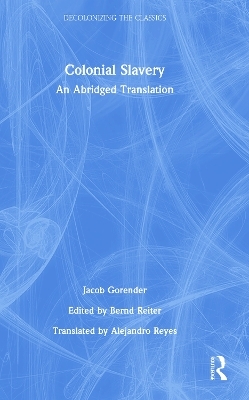
Colonial Slavery
Routledge (Verlag)
978-0-367-43425-0 (ISBN)
Jacob Gorender's (1923–2013) 1978 book, Colonial Slavery (O Escravismo Colonial), comes alive for English language readers thanks to Bernd Reiter and Alejandro Reyes's brilliant translation.
Gorender argued that slave-holding societies produced an economic system sui generis, not fitting into any of the established societal categories offered by Karl Marx and Max Weber. As such, Gorender proposed a theory of colonial slavery as the structuring force of slave-holding societies. For him, slave-holding societies are different from other societies in that slavery structured them differently. This is of the utmost relevance to this day as it allows for a new and different way to explain contemporary racial inequalities in post-slavery societies. An accomplished interpreter of Brazilian social formation, Gorender was motivated by the need to understand the historical roots of class domination and the emergence of Brazilian capitalist society. His presentation of rich historical data, rigorous theoretical and analytical framework, and militant action as an active member of the Brazilian Communist Party are the hallmarks of his writing.
Colonial Slavery: An Abridged Translation is a must-read for researchers, teachers, and students of history, sociology, economics, politics, as well as activists of the Black movement and other movements committed to anti-racism.
Jacob Gorender was born on January 20, 1923, in Salvador, Brazil. He studied at the Brazilian Israeli School, at the Bahia High School, and enrolled in the Law School in Salvador. He interrupted his legal studies to join the fight against Fascism in Italy during WWII. In April 1968, he cofounded the Brazilian Revolutionary Communist Party (Partido Comunista Brasileiro Revolucionário – PCBR). In 1970, he was imprisoned and tortured. He began writing Colonial Slavery in 1974 and finished in 1976. It was published by Ática in 1978 and was quickly sold out. In Brazil, the book is in its 6th edition (2010). In 1994, Gorender received the title of Doctor Honoris Causa from the Federal University of Bahia. From 1994 to 1996, he served as visiting professor at the Institute for Advanced Studies of the University of São Paulo (USP). In 1996, he received the title of specialist of Notorious Knowledge from the Faculty of Philosophy, Letters, and Human Sciences at USP. He died June 11, 2013 at the age of 90. Bernd Reiter is Professor of Classical and Modern Languages and Literature at Texas Tech University, and the editor of Routledge's Decolonizing the Classics book series. Prior to joining academia, he worked as a social worker and NGO consultant in Brazil and in Colombia. He earned his PhD in comparative politics from the City University of New York's Graduate Center and has been a visiting scholar in Germany, Brazil, Colombia, and Spain. He is recipient of the Fulbright Distinguished Chair in Public Policy, Brazil 2021–2022 award. Reiter's work focuses on race, democracy, citizenship, and decolonization. His publications include The Dialectics of Citizenship (2013), Bridging Scholarship and Activism (2014), The Crisis of Liberal Democracy and the Path Ahead (2017), and Constructing the Pluriverse (2018). Alejandro Reyes is a writer, translator, activist, and independent journalist. He was born in Mexico City in 1963 and has lived in the United States, Brazil, and France. He has an MA in Latin American Studies and a PhD in Latin American Literature from the University of California at Berkeley. He is a public speaker, with conferences on marginal literature and social movements in Mexico and Brazil. He is cofounder of the alternative media collective Radio Zapatista. He currently lives in Chiapas, Mexico.
Part I: Fundamental Categories 1. Colonial Slavery: A Historically New Mode of Production 2. The Category of Slavery 3. The Plantation Form of Organization of Slave Production Part II: Genesis 4. Portuguese Society and Overseas Expansion 5. Original Sources of Slave Labor Force 6. Aspects of the Establishment of Slave Plantations in Brazil Part III: Specific Laws of the Colonial Slave Mode of Production 7. Introduction 8. Law of Money Income 9. Law of the Initial Investment to Acquire the Enslaved Person 10. Effects of the Law of Initial Investment to Acquire the Enslaved Person 11. Laws of the Rigidity of the Slave Workforce 12. Law of the Correlation between the Mercantile Economy and the Natural Economy in Slave Plantations 13. Socioeconomic Dynamics and Historiography 14. Categories Extraneous to the Concept of Colonial Slavery 15. Dualism, Integrationism, and Other Interpretations of History 16. Law of the Enslaved Population 17. Factors Opposed to the Growth of the Enslaved Population Part IV: Territorial Regime and Land Rent 18. Territorial Regime in Slaveholding Brazil 19. Industrial Slave Rent and Slave Ground Rent Bibliographic References
| Erscheinungsdatum | 08.03.2022 |
|---|---|
| Reihe/Serie | Decolonizing the Classics |
| Übersetzer | Alejandro Reyes |
| Zusatzinfo | 17 Tables, black and white |
| Verlagsort | London |
| Sprache | englisch |
| Maße | 178 x 254 mm |
| Gewicht | 680 g |
| Themenwelt | Geschichte ► Teilgebiete der Geschichte ► Wirtschaftsgeschichte |
| Geisteswissenschaften ► Philosophie | |
| Sozialwissenschaften ► Ethnologie | |
| Sozialwissenschaften ► Politik / Verwaltung | |
| Sozialwissenschaften ► Soziologie ► Spezielle Soziologien | |
| ISBN-10 | 0-367-43425-3 / 0367434253 |
| ISBN-13 | 978-0-367-43425-0 / 9780367434250 |
| Zustand | Neuware |
| Haben Sie eine Frage zum Produkt? |
aus dem Bereich


